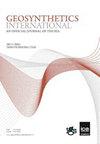土工格栅锚固板桩墙;一个小规模的实验和数值研究
IF 3.3
2区 工程技术
Q2 ENGINEERING, GEOLOGICAL
引用次数: 1
摘要
使用土工格栅锚定板桩墙(SPW)是相对较新的。进行了一系列小规模试验,以研究土工格栅锚定spw在条形基础附加荷载作用下的性能。采用颗粒图像测速(PIV)技术测量土体位移,分析土体整体破坏机制和主要土-土工格栅相互作用机制。其中一项试验是在8倍宽的试验箱中重复进行的,这表明试验箱小宽度的影响是可以接受的。采用二维有限元模型(PLAXIS)对试验进行模拟,结果与试验结果吻合较好。条形基础荷载的位置、土工格栅锚杆的长度和数量是决定地基承载力的关键因素。这些结果为土工格栅锚的稳定效果和有效长度提供了新的见解,换句话说,土工格栅-土壤摩擦被调动的长度。与荷兰加筋土墙和传统锚固板桩墙的设计准则相反,结果表明土工格栅在条形基础附加荷载作用下的活动区域提供阻力。本文章由计算机程序翻译,如有差异,请以英文原文为准。
Geogrid-anchored sheet pile walls; a small-scale experimental and numerical study
The use of geogrids to anchor Sheet Pile Walls (SPW) is relatively new. A series of small-scale tests was performed to investigate the behaviour of geogrid-anchored SPWs subjected to strip footing surcharge loading. Particle Image Velocimetry (PIV) techniques were used to measure soil displacement and analyse the global failure mechanism and dominant soil-geogrid interaction mechanisms. One of the tests was duplicated in a test box that was eight times as wide, showing that the influence of the small width of the test box was acceptably small. A 2D finite element model (PLAXIS) was used to simulate the tests and there was a reasonable match with the test results. The position of the strip footing load, and the length and number of the geogrid anchors, proved to be key factors in determining the bearing capacity. The results provide new insights into the stabilising effect and the effective length of the geogrid anchors, in other words the length along which geogrid-soil friction is mobilised. Contrary to the Dutch design guidelines for reinforced soil walls and conventionally anchored sheet pile walls, the results showed that the geogrid provides resistance in the active zone under the strip footing surcharge loading.
求助全文
通过发布文献求助,成功后即可免费获取论文全文。
去求助
来源期刊

Geosynthetics International
ENGINEERING, GEOLOGICAL-GEOSCIENCES, MULTIDISCIPLINARY
CiteScore
6.90
自引率
20.00%
发文量
91
审稿时长
>12 weeks
期刊介绍:
An online only, rapid publication journal, Geosynthetics International – an official journal of the International Geosynthetics Society (IGS) – publishes the best information on current geosynthetics technology in research, design innovation, new materials and construction practice.
Topics covered
The whole of geosynthetic materials (including natural fibre products) such as research, behaviour, performance analysis, testing, design, construction methods, case histories and field experience. Geosynthetics International is received by all members of the IGS as part of their membership, and is published in e-only format six times a year.
 求助内容:
求助内容: 应助结果提醒方式:
应助结果提醒方式:


